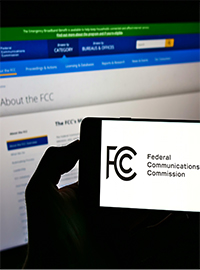| U.S. Senate Must Reject Biden FCC Nominee Gigi Sohn |
 |
|
By Timothy H. Lee
Thursday, October 28 2021 |
Few quarters of American society absorbed the Covid shock serviceably, but the U.S. internet service sector offered one welcome example to the contrary. Internet service actually improved over the course of the pandemic despite an onslaught of online traffic, and even today offers a rare exception to inflationary pressures infecting the rest of the American economy. Naturally, the Biden Administration therefore seeks to disrupt the internet service sector in its broader crusade to radically reshape the U.S. economy and society. Specifically, the Biden Administration this week nominated progressive activist Gigi Sohn to the critical Federal Communications Commission (FCC). If confirmed, Sohn would break a current 2-2 Republican/Democrat split. Here’s the kicker: We’re over nine months into the Biden Administration's tenure, yet the president is just now submitting Sohn's nomination in haste to prevent the FCC from experiencing a 2-1 Republican majority when the current term of Democratic Commissioner Jessica Rosenworcel, who has been selected to chair the FCC, expires. Senate Republicans mustn’t hand the Biden Administration a “get out of jail free” card or do it a favor by rushing to confirm Sohn. Rather, they and reasonable Democrats should oppose Sohn lest her hyper-partisan agenda threaten the thriving and increasingly critical internet service sector. The stakes are too high. For context, it’s worth revisiting how well the U.S. internet service sector performed throughout the pandemic. Incredibly, despite nationwide quarantines and surges in internet use, U.S. broadband speeds actually increased by 91%. Who saw that coming? It would’ve been unsurprising if internet speeds crashed amid that onslaught, but speeds nearly doubled instead. Compare that U.S. performance to Europe, where internet service bottlenecks and overload prompted regulators to ask giant tech content providers like Netflix to throttle back. If allowed to sit on the FCC, however, Ms. Sohn would undermine our private broadband sector and remake it in that demonstrably inferior European image. First and foremost, she has signaled support for rate regulation of broadband and is a staunch advocate of government-owned broadband, which would undermine private investment and network expansion, as well as the jobs that investment and expansion create. Private internet service providers would instantly become less likely to invest their capital when they would suddenly be forced to compete against government, which possesses the power to create regulations to its advantage and access taxpayer dollars to subsidize failures and crowd out private competitors. The end result is invariably the same: fewer choices for consumers, inferior performance and bailouts at taxpayer expense. Ms. Sohn also favors radical reimposition of Title II so-called “Net Neutrality” regulations, which would regulate private internet service as a “pubic utility” under 1930s statutes aimed at copper-wire telephones. As real-world experience confirms, the result would be catastrophic for American consumers. The internet flourished upon its introduction in the 1990s on the basis of the “light touch” regulatory approach adopted by the FCC through both Republican and Democratic administrations. But then in 2015, radicals with oversized influence in the Obama Administration got the bright idea that an internet that wasn’t broken needed to be “fixed” according to their ideological agenda. Accordingly, the Obama FCC imposed Title II “Net Neutrality” regulation, and the negative effects were immediate. Namely, for the very first time ever outside of an economic recession, private internet investment actually declined. Between 2010 and 2013, private wireless investment had increased by 33%, or $8 billion, but after imposition of Title II regulations it plummeted by $5.6 billion in just the first year. When the Trump Administration FCC under Chairman Ajit Pai subsequently reversed the Obama FCC’s Title II regulation, private investment rebounded and internet service speeds immediately increased. Ms. Sohn apparently couldn’t care any less about that real-world demonstration of the folly of the Title II agenda. She’d be happy to break a lot of eggs to make her ideological omelet. Americans and the Senators who represent them, however, shouldn’t tolerate it. As further testament to the thriving U.S. internet service sector, the federal Bureau of Labor Statistics just announced that even while inflation begins to deepen across the rest of the economy, internet service costs actually declined year-over-year. Accordingly, the U.S. internet service sector isn’t at all broken, and it’s certainly not in need of the “fixes” that Gigi Sohn would bring if confirmed to the FCC. She’s also notoriously weak on U.S. intellectual property rights, and advocates imposition of consumer privacy laws in a crony capitalist manner. Ms. Sohn is simply too radical to be confirmed to the FCC at a time when Americans rely more than ever on a thriving internet service sector, and the Biden Administration has only itself to blame for its delay in nominating her. The U.S. Senate should reject her nomination and spare us the enormous risk she presents. |
























